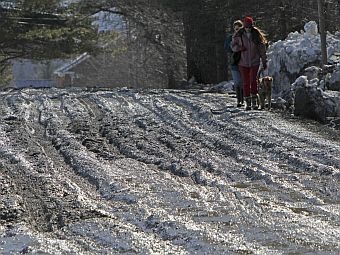 (Host) This year’s mud season has been especially bad so far in some spots, with axle-deep ruts. In other spots it’s better than expected.
(Host) This year’s mud season has been especially bad so far in some spots, with axle-deep ruts. In other spots it’s better than expected.
VPR’s Susan Keese did some investigating and learned that even for the experts, Vermont’s infamous "fifth season" often defies prediction.
(Truck sounds)
(Keese) The southern Vermont town of Marlboro has 64 miles of town road. Fifty-eight are unpaved.
Dave Elliot is the town road foreman. He says newcomers often ask if it’s better to stay on top of the ruts or go inside them.
(Elliot) "A lot of ‘em used to say stay on top of the ruts if you can. And if they’re stiff enough you can do that. But if it’s real soupy, I tend to try to look for almost the soupiest ruts because those are the ones that people are making it through."
(Keese) Elliot admits his strategy doesn’t always work. He says the best advice is to stay in low gear and keep moving. That and have another car – a beater – if you have a road that turns to mush in March.
But Elliot thinks the worst of it’s past in Marlboro He says the warm spots on the roads, the ones that catch the sun and dry out first, are dry already.
The crew used last week’s freeze to get their trucks into the trouble areas and fill the ruts with stone.
(Elliot) "It may be wishful thinking on my part, but I think we’re into our colder sections right now up here anyways, and I don’t think we’re looking too bad. I think we’re looking a lot better than I thought it was going to be."
(Keese) Further north in Danby, farmer Steve Cash is pretty sure it’s just beginning. He says the Danby Mountain Road is bad already.
(Cash) "What worries me is that there’s still a lot of moisture in the ground, and so if it’s bad at this point, I believe it’s going to get worse."
(Keese) Some people in Calais say that this year is the worst they’ve ever seen. Sue Cioffi is the school secretary at Calais Elementary. She says her road, the road the school’s on, is like molasses, especially when it’s warm.
(Cioffi) "One of our buses had to back up one day because a car was stuck in the road and it was going to be a little while before the car could be towed out."
(Keese) Bill Ahearn is the state Agency of Transportation’s expert on unpaved roads. He says the timing and severity of mud season is a complicated equation. It involves weather, soil types and the amount of traffic a road sees.
Mainly it’s about water trying to leave the frozen ground.
(Ahearn) "Generally snowfall isn’t what makes the mud season, it’s the frost depths and then the manner in which the soils thaw when spring arrives."
(Keese) Ahearn says there’s an adage that a good rain during mud season will smooth things out. But that’s only partly true.
(Ahearn) "When you get rain and it soaks in it actually does help to warm the soils. But, unfortunately, if you’re going back through a freeze cycle, that’s when it actually wreaks havoc with the roadway itself."
(Keese) Ahearn says freezing makes it easier to work on a road without trucks creating further damage. But it actually prolongs the season by trapping water, which can make more mud.
Ahearn says new materials have made the work of road crews more effective in mud season, but the only prediction he’ll make is that it isn’t over yet.
For VPR News, I’m Susan Keese.